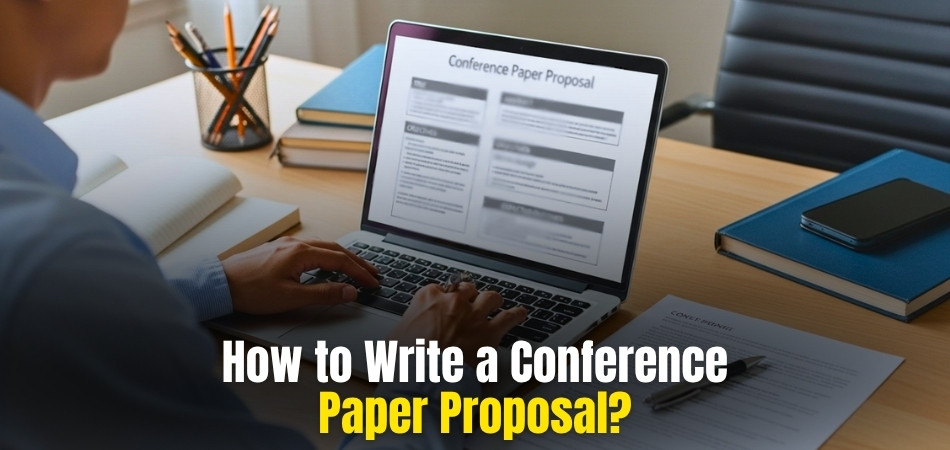A conference paper proposal is your first step toward sharing your ideas with a larger audience. Many people wonder about the best way to present their topic and make their proposal stand out. If you’ve ever thought, even for a moment, about how to write a conference paper proposal, you’re in the right place.
To write a conference paper proposal, choose a focused topic, explain its importance, and describe what your paper will cover. Make sure your proposal follows the conference rules, has a clear title, a strong introduction, and stays simple and easy to understand. Always check for mistakes before sending.
Are you curious about the details or want to know more about making your proposal successful? Keep reading this article to find every important step, tip, and example you need to write a strong conference paper proposal.
How to Write a Conference Paper Proposal?
Writing a conference paper proposal might sound difficult at first, but don’t worry—it’s actually not that hard once you understand the steps. It’s all about sharing your ideas clearly and in a simple way. A good proposal helps others see why your topic matters and why they should care. Here are some details about how to write a conference paper proposal:

Pick Your Topic
First, choose a topic that you enjoy and can talk about easily. Make sure it’s something others would find interesting too. Try to keep it clear and not too wide or confusing. A focused topic makes your proposal stronger. It also helps you stay on track while writing.
Know the Purpose
Before you start writing, think about why you are writing the proposal. You want to explain what your paper is about and why it’s important. You’re not writing the full paper yet—just giving a clear idea of it. This helps the people reading your proposal decide if it fits the conference. So, always stick to the main point.
Understand the Rules
Each conference has its own rules for how to send in your proposal. Some might ask for a short summary; others might want more details. For example, upcoming conferences in USA may have different guidelines compared to ones in other countries or states. Read all the instructions carefully before you start writing. Follow the format they ask for—this shows that you can follow directions and respect their time.
Write a Clear Title
Your title should tell people what your paper is about in just a few words. Try not to make it too long or confusing. A good title grabs attention but also stays simple. Don’t use hard words or fancy language. Think of it like naming a story you want people to read.
Make a Strong Start
Start your proposal with a short paragraph that explains your topic. This part should be simple and to the point. Let the reader know what problem or question your paper will talk about. Keep it interesting so they want to read more. Avoid jumping into deep details right away.
Explain Your Idea
Now it’s time to talk more about your topic. Say what your main idea is and why it matters. You can also give a short example or point to support your idea. Try not to go off-topic or add too much. Just stay clear and focused.
Keep It Simple
Use short sentences and simple words. The people reading your proposal should understand it without reading it twice. Don’t try to sound too smart or use words you wouldn’t use in real life. The goal is to make your idea easy to follow. Clear writing always works better than complicated writing.
Check Before Sending
Before you send your proposal, read it again. Fix any mistakes and make sure everything makes sense. Ask yourself if someone else could understand what you’re saying. A clean, mistake-free proposal looks more professional. It also shows that you care about your work. Below is a sample of conference paper proposal and how you can send it through email:
Conference Paper Proposal Sample
Title: How Social Media Affects Teen Communication
Proposal:
This paper will explore how social media changes the way teens talk and connect with others. It will focus on both the good and bad sides, like staying in touch with friends versus spending less time talking face-to-face. The paper will also look at how messaging and apps affect real conversations. By understanding these changes, the goal is to show how social media shapes communication and what we can do to keep it healthy.
Sample Email Message to Send Proposal
Subject: Conference Proposal Submission – How Social Media Affects Teen Communication
Email Body:
Dear [Organizer’s Name],
I hope you’re doing well. Please find attached my conference paper proposal titled “How Social Media Affects Teen Communication” for your kind consideration.
The proposal looks at how social media is changing the way people talk, especially among teens, and shares simple ideas that could help improve communication.
Let me know if anything else is needed. Thank you for your time.
Best regards,
[Your Full Name]
[Your Email Address]
[Your Phone Number (if needed)]
Key Elements You Can Include in Your Conference Paper Proposal
When you put together a conference paper proposal, it’s important to include some key parts that help explain your work clearly. Knowing what to include makes your ideas easy to follow and shows why your research matters. Continue reading to learn about the key components that will make your proposal strong and complete.
Clear Title
Your title should be simple and give a good idea of what your paper is about. It needs to catch attention without being too long or complicated. A strong title helps readers quickly understand the topic. Try to avoid using difficult words or too many details. Think of your title as a quick summary that invites people to learn more.
Brief Abstract
A short abstract tells the reader what your paper will cover in a few sentences. It should explain the main idea and what you want to find out or show. This part gives a quick look at your work and why it matters. Writing a clear abstract helps the conference organizers decide if your topic fits with their event.
Main Objectives
Your proposal should explain the goals or questions your paper will answer. This helps others see what you want to achieve with your research. Being specific about your objectives keeps your work focused and on track. It also makes your proposal easier to understand and shows you have a clear plan.
Methodology Plan
In this part, you describe how you will carry out your research or study. Talk about the steps, tools, or methods you will use to collect information or test your ideas. Make sure it sounds logical and possible to do. Explaining your method well shows that you have a clear plan and know what you’re doing.
Expected Outcomes
Let people know what you expect to find or show by the end of your paper. This helps others understand the value of your research. Sharing possible results shows that your work can add new ideas or solve problems. Keep your predictions realistic and related to your main topic.
Relevance to Theme
Explain how your paper fits with the theme or focus of the conference. This connection shows why your work belongs there and why it’s important. Pointing out this link helps organizers see the value in your proposal. Always try to match your ideas with what the conference wants to highlight.
How to Get Feedback on Your Conference Paper Proposal Before Submission?
Getting honest feedback before you send your conference proposal can make a big difference. Sometimes small changes make your work stronger and easier to understand. Here are some simple ways to improve your proposal before submitting it:
Ask a Friend
You don’t need an expert to get useful feedback. A friend with good reading skills can spot unclear points or missing ideas. They can tell you if something is confusing or too long. Getting their opinion helps you check how your proposal sounds to a fresh reader. Their advice often brings out things you didn’t notice.
Talk to a Mentor
If you know someone who has done this before, they can give great tips. Mentors can tell you if your topic is clear and your plan makes sense. They might even share what worked for them in the past. Their feedback can help shape your writing and give your proposal more strength. Always thank them for their time and help.
Join a Group
Sometimes people gather in groups to share and review each other’s work. These groups can be online or in person. When you show your proposal to more people, you get more helpful advice. Everyone sees things in a different way, which helps you improve. A group review can give you more confidence before you submit.
Read Similar Work
Before sharing your draft, it’s smart to look at work done by others. To improve your proposal, it’s often beneficial to read a conference research paper similar to your topic. This helps you grasp the structure and level of detail expected, making it easier to get meaningful feedback before submission. Reading other papers gives you better ideas for your own writing. It also shows you what to include and what to avoid.
Accept Feedback Well
Not all feedback will be perfect, but most of it is meant to help you. Stay calm even if you hear something you don’t like. Think about what’s useful and what you can change. You don’t have to follow every suggestion, just the ones that make your work better. Being open helps you grow as a writer.
Fix and Review
Once you’ve received feedback, go back and make the changes. Check if your proposal is now clearer and easier to follow. After fixing things, read it again from start to finish. This final review helps catch small mistakes you may have missed. Don’t rush—take your time to get it right.
Mistakes to Avoid When Writing a Conference Paper Proposal
Even a good idea can get rejected if the proposal isn’t clear or complete. Small errors can make a big difference. Here’s what to watch out for so your proposal has a better chance of getting accepted.
- Unclear Main Idea: The topic is not explained well, making it hard for readers to understand what the paper is really about.
- Weak Objectives: Missing or vague goals can make your proposal look incomplete and confuse reviewers about what your paper plans to achieve.
- Poor Structure: A messy layout makes your proposal hard to follow and weakens the overall message you’re trying to share.
- Too Much Detail: Including unnecessary points makes your proposal long and confusing, which can push readers to skip or ignore it.
- Off-Topic Content: Writing things not related to your main subject can make your proposal feel unfocused and less meaningful to the reviewers.
- Complicated Language: Using big or difficult words can confuse readers and make your message less clear or harder to understand quickly.
- Ignoring Guidelines: Not following the format or word count rules shows a lack of care and can lead to automatic rejection by the committee.
- Missing Relevance: If you don’t explain how your topic fits the conference theme, reviewers may think your paper doesn’t belong there.
What to Do After Submitting Your Conference Paper Proposal?
Once you send in your conference paper proposal, the waiting begins. It might feel like there’s nothing to do, but that’s not true. There are a few things you can start preparing while you wait. Keep reading to find out what steps come next.
Wait for Reply
After you submit your proposal, the team will take some time to review it. They may have many proposals to read, so be patient. Most conferences will give a date for when you’ll hear back. Don’t worry too much if it takes a little longer. Use this time to relax or work on something else.
Check Your Email
Make sure you check your email regularly so you don’t miss any updates. Sometimes they may ask for small changes or more information. If they send a message, try to reply quickly and clearly. Always keep your proposal file saved in case they need it again. A fast reply shows you are serious.
Plan for Approval
If your proposal gets accepted, you’ll need to get ready to write your full paper. You can start by making a rough outline. Thinking early about the steps of writing a conference research paper can help you organize your ideas and make the writing process easier. Getting started ahead of time can also help you avoid stress later. Even if you’re not sure yet, it’s a good idea to plan ahead.
Be Ready for Edits
Sometimes the reviewers might like your proposal but ask for a few changes. This is normal and not a bad thing. Just read their suggestions and make the edits they ask for. Try not to take it personally—it means they want your paper to be even better. Doing these edits quickly helps keep things on track.
Learn from It
Even if your proposal isn’t accepted, don’t feel bad. Try to learn from the feedback, if they give any. You can always improve your idea and try again next time. Each try helps you get better at writing and sharing your ideas. Every experience teaches you something useful.
Stay Updated
Sometimes conferences send updates about deadlines, schedules, or other changes. Keep checking their website or emails for any news. If they share any tips or resources, use them to get ready. Staying updated helps you avoid missing anything important. It also shows that you care about being prepared.
Frequently Asked Questions
When writing a conference paper proposal, you may still have questions that weren’t directly covered in the main article. These frequently asked questions dive deeper into the process, offering helpful tips and practical guidance to clear your doubts and make your proposal even stronger.
What Tone Should I Use in My Conference Paper Proposal?
Use a respectful, professional, and confident tone in your proposal. Avoid sounding too casual or overly formal. Your tone should show that you understand your topic and care about it, while still being approachable and easy to read for any reviewer.
Can I Include Personal Experience in My Proposal?
Yes, if it adds value to your topic. A short, relevant personal experience can show why the topic matters or how it connects to real life. Just make sure it supports your main idea and doesn’t take focus away from your research or purpose.
How Long Should a Typical Conference Paper Proposal Be?
Most conference proposals are between 250 and 500 words long, but it depends on the guidelines. It’s important to say enough to explain your topic clearly, but avoid going over the limit. A clear and focused proposal is better than a long, confusing one.
Is It Okay to Use Quotes or Citations in a Proposal?
You can use one or two short quotes or references if they support your idea, but don’t overdo it. A proposal is mainly about your own thoughts and plans. If you use any sources, make sure to give credit properly and keep it brief.
Do I Need to Include Keywords in My Proposal?
Some conferences ask for a few keywords at the end of the proposal. These help organizers group similar topics and find matches for sessions. Choose words that clearly reflect your subject and main ideas. Don’t use too many—three to five is usually enough.
Can I Reuse the Same Proposal for More Than One Conference?
Yes, but only if the topic fits both conferences. You may need to adjust the format, title, or focus depending on each event’s theme and rules. Always read the guidelines carefully and tailor your proposal to match what each conference is looking for.
How Do I Show Originality in My Proposal?
Originality comes from sharing a fresh idea, a new angle, or a unique example. Even common topics can stand out if you present them in a thoughtful or creative way. Avoid copying others and focus on what makes your idea different or useful.
Final Thoughts
Writing a conference paper proposal may seem like a big task at first, but with the right steps, it becomes manageable and even exciting. Think of it as your chance to share your voice and ideas with people who care about your topic just as much as you do.
Whether you’re new to this or have tried before, learning how to write a conference paper proposal helps you build confidence, clarity, and structure in your academic work. It’s not just about being accepted—it’s about growing as a thinker and writer.
Still wondering how to craft a conference paper proposal that stands out? Take your time, follow each step, and trust your process. With practice and care, you’re well on your way to writing a proposal that truly makes an impact.







